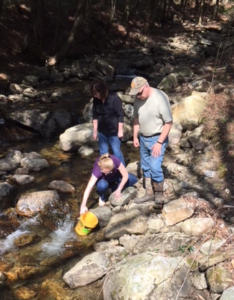In January brook trout eggs were received from the Sunderland State Fish Hatchery and placed in an aquarium at Taconic High School in Pittsfield. This was part of the Trout-in-the- Classroom program which MassWildlife sponsors. The eggs hatched about two weeks later and they were raised by some 80 or so Taconic High School students from grades 9 through 12. They have been attended to by the students, under the watchful eyes of teachers Michelle Potash and Tonya Michaud. They were fed pellets and remained there until last Thursday when they were set free.
I had hoped to get pictures of the kids releasing them but due to transportation issues (funding to provide bussing to bring the kids to Windsor) and other issues, none of the kids were able to make it. It’s a shame that after all of the attention and care that the kids gave to raise these fish, they could not be there to watch their liberation. Thanks to the above-mentioned dedicated teachers, who took the time to drive the brook trout to the release location. And thanks to teacher Ron Wojcik who coordinated the release site and time.
Youngsters take note! The unnamed stream where they were released runs across property owned by Tom Garvey (Maybe we should name it Tom’s Brook?) One could not choose a better place to release these fish, for it is a cold, clean little brook that doesn’t dry up in the summer and is a tributary to nearby Windsor Brook in Windsor. All of the little fry (perhaps 1 ¼ inches in length) appeared happy in their new home. They immediately acclimated to the currents, and back currents so that they constantly faced into them. Care was taken to not put them in pools where larger trout were likely to live and, given the opportunity, would gobble them up.
Those fish are not forgotten once released, for Tom keeps a close eye on them and feeds them daily. He even covers the stream with wire mesh in order to keep the blue herons from getting at them and eating them up. (herons love small brook trout, they can’t get enough of them). Tom has been through this routine before for this marks the 4th year that they have been released on his property. He observes them until the fall when the fish by that time are perhaps 3 inches long. That is when they disappear up or downstream and find new territories in which to reside.
Trout Stockings
The following waters were scheduled to be stocked with bigger trout last week, subject to change. Please note that Onota Lake in Pittsfield and Windsor Pond in Windsor have also been stocked with tiger trout. In addition to those waters, the following waters have been stocked: Deerfield River in Buckland, Charlemont, and Florida; East Branch of the Westfield River in Chesterfield, Cummington, Savoy and Windsor; Littleville Reservoir in Chester and Huntington, Upper Highland Lake in Goshen, Housatonic River C&R in Lee and Stockbridge, Farmington River in Otis and Sandisfield and Laurel Lake in Lee.
Northern Pike Stocking
The DFW stocked more than 16,000 fingerling-sized northern pike into Cheshire Reservoir on Friday, April 27. These 4″ fish, which will take about 3 years to reach the 28″ minimum harvest size, were obtained from New Jersey DFW as part of a cooperative exchange program.
Northern Pike naturally reproduce in several waterbodies in the state. In the Berkshires, the natural reproduction is able to sustain the fishery in the Housatonic River (including Woods Pond) and in Pontoosuc, Onota, Buel, and Cheshire lakes.
MassWildlife also stocks some locations with sterile Tiger Muskellunge, which is a cross between a northern pike and muskellunge, and is a member of the esocid family. MassWildlife does not have a warm water hatchery in which to rear esocids but usually obtains a small number of 3–12 ” fish each year from the NJ DFW. They are stocked in selected Massachusetts waters with sufficient habitat to support them. It takes 5 or more years for them to attain the 28″ minimum legal length.
Training Range Safety Officers
The Lee Sportsmen’s Association will be conducting Range Safety Officer (RSO) Training on May 19 at 9 am. The minimum age to become a credentialed NRA RSO is 21, and one must provide a valid and current NRA membership number on the day of the course. After the instructor submits the training report, applicants will be able to complete credentialing process online (nrainstructors.org). The Cost of this course is $100, and the Cost of a 2-year credential for NRA members is $30 ($50 for non-NRA members). If you are not already an NRA member, and would like to become one prior to taking this course, it is recommended you call the NRA rather than join online.
Registration is required, and the registration form can be downloaded and printed from nrainstructors.org website, RSO Course Registration Form. Contact Rob McDermott for questions, concerns, and registration at 413-232-7700 or email robmcdermott@verizon.net
International Defensive Pistol Association
The IDPA will be having a Steel Action Shoot on Sunday, May 20 at the Lee Sportsmen’s Association. For information, contact Shawn Sullivan at ssullee@icloud.com.
Endangered Species Day
This year, Endangered Species Day is observed on May 18. The United States Congress appointed this day to recognize efforts in conserving rare species. Through the Massachusetts Endangered Species Act, Massachusetts also protects local native species that may or may not be federally protected. Over 425 endangered, threatened, or special concern animals and plants live in Massachusetts. Species from the majestic bald eagle to the unusual mountain cranberry need protection. Even though many, like the peregrine falcon, have come a long way, our native species still need help.
MassWildlife’s Natural Heritage and Endangered Species Program implements the state’s Endangered Species Act. This happens through field surveys and research, regulations, habitat management, land protection, and education. But the Program needs you to help monitor rare species by telling MassWildlife when you see them. You can also help by donating directly to the Natural Heritage and Endangered Species Program. Find out more by visiting mass.gov/supportnhesp.
Fishing Derbies
The Stockbridge Sportsmen’s Club is having its Spring Fishing Derby at the boat ramp on Stockbridge Bowl next Sunday, May 20 from dawn until 3:00pm. Prizes of $100 will go the heaviest trout, pickerel, bass and bullhead. There will be free lures for all kids 12 and under. Hot breakfast and lunch will be available. Pre-registration fee is $10 and post registration is $15. Tickets are available at the Minkler Insurance Agency, 31 Main Street, Stockbridge, (W)413-644-3590, (H)413-298-4630 or from any club member.
DFW Director Jack Buckley retires
After 30 years of service with the DFW (MassWildlife), Director Jack Buckley retired on April 30, 2018. Appointed as Director by the Fisheries and Wildlife Board in 2015, Buckley supported new outreach initiatives such as social media and agency re-branding; focused efforts on hunter and angler recruitment, retention, and reactivation; accelerated habitat management activities on MassWildlife lands; procured habitat management grant funding for private landowners and municipalities; and partnered with the Massachusetts Water Resources Agency for a pipeline to supply the McLaughlin Hatchery in Belchertown with gravity-fed water from Quabbin Reservoir. During this time, MassWildlife celebrated its 150th Anniversary, opened its new LEED Platinum certified Field Headquarters in Westborough for meetings and events to a wide variety of state agencies and conservation groups, and continued to protect and manage over 200,000 acres of important fish and wildlife habitat to benefit both wildlife and people. 
The majority of Buckley’s career with MassWildlife was spent as Deputy Director of Administration and Personnel. He was responsible for personnel, fiscal, and budgetary management, legislative and external affairs, federal aid, information and education, licensing and permits, land acquisition, and the Natural Heritage and Endangered Species Program. In 1998–2002, he also served as a Special Assistant to Secretary of Environmental Affairs Robert Durand for Forest Policy and Land Protection. Probably his most important contribution to the agency was his work on the Massachusetts Endangered Species Act (MESA) legislation, the creation of MassWildlife’s Natural Heritage and Endangered Species Program, and his involvement with a lawsuit that went before the Massachusetts Supreme Court. The Court ultimately affirmed the agency’s authority and actions relative to enforcement of MESA.
Buckley was MassWildlife’s representative on the Public Access Board and the Pesticide Board. In addition, Buckley represented the Division on several committees of the Association of Fish and Wildlife Agencies, including Legislative Affairs, Federal Budget, and International Affairs. He was the regional representative of the northeastern states to the Convention on International Trade in Endangered Species (CITES) Technical Work Group.
Jack Buckley earned a Bachelor of Science and Master’s Degree in Fisheries Biology from the University of Massachusetts in Amherst where he studied the endangered shortnose sturgeon in the Connecticut River. He worked at the Massachusetts Cooperative Fishery Research Unit at the University of Massachusetts as a Research Assistant and was promoted to Project Leader. Buckley then performed a stint as first Chief of Fisheries Management in Washington D. C. where he was responsible for developing the fisheries management program for the District of Columbia. His work in advancing fish and wildlife conservation has been recognized on local, regional, and national levels. Buckley was honored by the Association of Fish and Wildlife Agencies with a Special Recognition Award in 2011 for his outstanding commitment to the work of the Association and with the Ernest Thompson Seton Award in 2013, honoring his leadership in scientific wildlife management as a CITES representative. The Massachusetts Sportsmen’s Council recently honored Buckley with a Lifetime Achievement Award.
The Fisheries and Wildlife Board has appointed previous Deputy Director Mark Tisa as Acting Director of the DFW.
